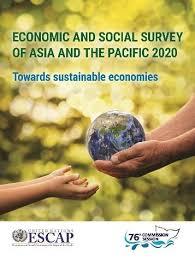
The novel coronavirus (COVID-19) pandemic is having far-reaching economic and social consequences for the Asia-Pacific region, with strong cross-border spillover effects through trade, tourism and financial linkages, according to a new report by the United Nations Economic and Social Commission for Asia and the Pacific (ESCAP) released today.
The Economic and Social Survey of Asia and the Pacific 2020 highlights the COVID-19 pandemic as the immediate risk to the region’s economic outlook, deepening the economic slowdown that was already underway. Although there are significant uncertainties surrounding the pandemic, the negative impacts are likely to be substantial.
As governments respond to the unprecedented health crisis and introduce economic stimulus packages, the report estimates that Asia-Pacific developing countries should increase health emergency spending by $880 million per year. The Survey also calls on Asia-Pacific countries to consider establishing a regional fund to respond to future health emergencies.
The ESCAP report suggests that, in the wake of the COVID-19 pandemic, policymakers should maintain accommodative macroeconomic policies to sustain the economic health of the region. Fiscal and monetary policies should be focused on supporting affected enterprises and households and preventing economic contagion. Fiscal spending can also play a significant role in enhancing the ability of health responders to monitor the spread of the pandemic, care for infected people and improve health emergency preparedness.
At the same time, countries should take the opportunity posed by these challenging times to rethink their economic development strategies towards a more inclusive, sustainable and planet-friendly economy. Countries in the region are not only going through a public health crisis but also a climate emergency, which is permanent and even more far-reaching and potentially more disastrous than the pandemic.
“Policymakers should not lose sight of people and the planet. When it comes to designing economic stimulus packages, social inclusiveness and environmental sustainability must be built into every decision,” said United Nations Under-Secretary-General and Executive Secretary of ESCAP Ms. Armida Salsiah Alisjahbana.
The ESCAP report further reveals that the decades-long high economic growth in the region has been accompanied by growing inequality of income and opportunity, and detrimental impacts on the planet, which are endangering the well-being of present and future generations. Unsustainable consumption and production patterns have substantially increased greenhouse gas emissions, exacerbating the vulnerability of the region to climate change. Additionally, $240 billion worth of annual subsidies continue to feed the region’s heavy dependence on fossil-fuels.
The Survey calls for a transition towards sustainable consumption and production, with cleaner production and less material-intensive lifestyles, supported by enabling policies. This would require all stakeholders, notably Governments, businesses and consumers, to urgently align their own goals and actions with the 2030 Agenda for Sustainable Development.
The report urges strengthening of regional cooperation to raise the ambition to tackle climate emergency. Governments should scale up their efforts on climate-related standards, carbon pricing and implement sustainable consumption and production patterns at the regional level.
Produced annually since 1947, the Economic and Social Survey of Asia and the Pacific is one of the longest-running United Nations reports on the region’s progress. The Survey provides analyses to guide policy discussion on the current and emerging socioeconomic issues and policy challenges to support inclusive and sustainable development in the Asia-Pacific region.
The full Economic and Social Survey of Asia and the Pacific 2020 may be accessed at:
https://www.unescap.org/publications/economic-and-social-survey-asia-and-pacific-2020
For media enquiries, please contact:
Ms. Kavita Sukanandan, Public Information Officer
Strategic Communications and Advocacy Section, ESCAP
T: (66) 2 288 1869 / E: sukanandan@un.org










Add new comment